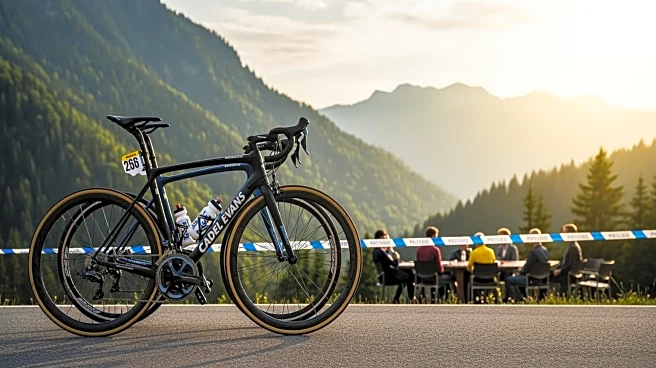What's Happening?
Cadel Evans, the 2011 Tour de France Champion, has shared his insights on the 2026 Tour de France route, emphasizing a strategic approach of maintaining two performance peaks rather than a single crescendo.
The 2026 route, unveiled in Paris, features a challenging course with a tough opening week and a brutal final stretch, including two finishes on Alpe d'Huez. Evans highlighted the importance of consistent performance throughout the race due to the numerous sprint stages and the demanding final mountain stages. The route begins with a Grand Départ in Barcelona and includes a team time trial on the first stage, which Evans notes changes the traditional approach to the race.
Why It's Important?
The insights from Cadel Evans are significant as they provide a strategic perspective on how to tackle one of the most prestigious cycling events in the world. The 2026 Tour de France route presents unique challenges that could impact the strategies of teams and riders. The emphasis on maintaining two peaks suggests a shift in how riders might prepare for the race, focusing on sustained performance rather than peaking at the end. This approach could influence training regimens and team strategies, potentially affecting the outcomes for general classification contenders and sprinters alike. The route's difficulty, particularly the double ascent of Alpe d'Huez, could lead to significant time gaps and impact the overall standings.
What's Next?
As the 2026 Tour de France approaches, teams and riders will likely adjust their training and race strategies to align with the challenging route. The focus on maintaining two peaks could lead to changes in how teams manage their riders' fitness and performance throughout the race. Fans and participants are expected to engage with the event through experiential sports tourism, with companies like Mummu Cycling offering immersive experiences. The demand for such experiences is growing, indicating a shift in how fans interact with major sporting events. The strategic insights from Evans and other cycling legends will continue to shape discussions and preparations leading up to the race.
Beyond the Headlines
The 2026 Tour de France route not only challenges riders but also highlights the evolving nature of professional cycling. The emphasis on strategic planning and consistent performance reflects broader trends in sports where data-driven approaches and meticulous preparation are becoming increasingly important. The route's design, with its focus on both sprint and mountain stages, underscores the need for versatility among riders. This evolution in race strategy could influence the development of future cycling talent and the way teams are structured. Additionally, the growing interest in experiential sports tourism suggests a cultural shift in how fans engage with sports, seeking deeper connections and participatory experiences.









